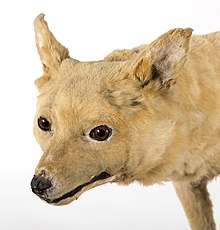

|
|
|
||
| Line 18: | Line 18: | ||
Kurī were used by Māori for a food source and considered a delicacy. [[James Cook|Cook]] sampled kurī on his 1769 voyage and declared that it was almost as tasty as lamb.<ref name=":0" /> |
Kurī were used by Māori for a food source and considered a delicacy. [[James Cook|Cook]] sampled kurī on his 1769 voyage and declared that it was almost as tasty as lamb.<ref name=":0" /> |
||
Kurī were |
Kurī were used to hunt birds.<ref name=":0" /> In addition, Māori used their skins and fur to make dog-skin cloaks ([[Māori traditional textiles#Kahu kurī|kahu kurī]]),<ref>{{Cite web|url=http://collections.tepapa.govt.nz/objectdetails.aspx?oid=68853|title=Kahu kuri (dog skin cloak)|work=Collections Online|publisher=Museum of New Zealand Te Papa Tongarewa|accessdate=20 July 2010}}</ref> belts,<ref>{{Cite web|url=http://collections.tepapa.govt.nz/objectdetails.aspx?oid=53958|title=Tatua (belt)|work=Collections Online|publisher=Museum of New Zealand Te Papa Tongarewa|accessdate=20 July 2010}}</ref> weapon decorations<ref>{{Cite web|url=http://collections.tepapa.govt.nz/search.aspx?advanced=colCollectionType:%22Taonga+Maori%22+colClassification:%22edged+weapons%22+colMaterials:%22dogskin%22+colCollectionGroup:CH|title=Edged Weapons with dogskin in the Taonga Māori Collection|work=Collections Online|publisher=Museum of New Zealand Te Papa Tongarewa|accessdate=20 July 2010}}</ref><ref>{{Cite web|url=http://collections.tepapa.govt.nz/search.aspx?advanced=colCollectionType:%22Taonga+Maori%22+colClassification:%22edged+weapons%22+colMaterials:%22dog+hair%22+colCollectionGroup:CH|title=Edged Weapons with dog hair in the Taonga Māori Collection|work=Collections Online|publisher=Museum of New Zealand Te Papa Tongarewa|accessdate=20 July 2010}}</ref> and [[Poi (performance art)|poi]].<ref>{{Cite web|url=http://collections.tepapa.govt.nz/objectdetails.aspx?oid=65427|title=Poi awe (percussive device)|work=Collections Online|publisher=Museum of New Zealand Te Papa Tongarewa|accessdate=20 July 2010}}</ref> |
||
== Extinction == |
== Extinction == |
||
| Kurī | |
|---|---|
 | |
| Origin | New Zealand |
| Breed status | Extinct |
| Dog (domestic dog) | |

Kurī is the Māori name for the Polynesian dog. It was introduced to New Zealand by the Polynesian ancestors of the Māori during their migration from East Polynesia in the 13th century AD. According to Māori tradition, the demigod Māui transformed his brother-in-law Irawaru into the first dog.[1]
Kurī were bushy-tailed, with short legs and powerful shoulders. Their coat colour ranged from yellowish brown to black, white, or spotted. Like other Polynesian dog breeds, they howled instead of barking – the Māori word for the howl was auau.[2]
Kurī were used by Māori for a food source and considered a delicacy. Cook sampled kurī on his 1769 voyage and declared that it was almost as tasty as lamb.[2]
Kurī were used to hunt birds.[2] In addition, Māori used their skins and fur to make dog-skin cloaks (kahu kurī),[3] belts,[4] weapon decorations[5][6] and poi.[7]
Kurī were seen everywhere in New Zealand during Cook's first voyage in 1769.[2] The kurī became extinct in New Zealand some time after the arrival of European settlers. The remains of the last known specimens, a female and her pup, are now in the collection of the Museum of New Zealand Te Papa Tongarewa.[8]
{{cite web}}: Cite has empty unknown parameter: |dead-url= (help)
{{cite book}}: |work= ignored (help){{cite journal}}: CS1 maint: unflagged free DOI (link){{cite journal}}: Cite journal requires |journal= (help){{cite journal}}: |author2= has generic name (help)|
Primitive dogs
| |
|---|---|
| Primitive hounds |
|
| Landrace dogs |
|
| Wild dogs |
|
| Hairless breeds |
|
| Extinct breeds |
|